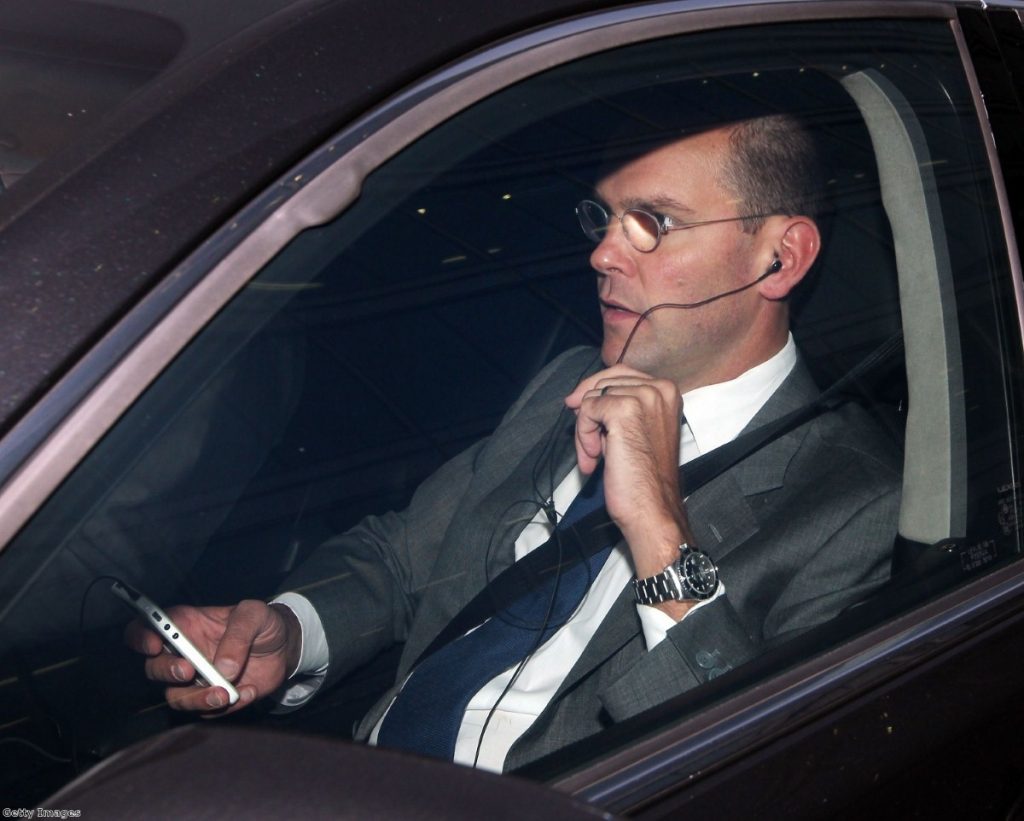Murdoch set for parliament recall after dramatic phone-hacking session
By Ian Dunt Follow @IanDunt
James Murdoch looks certain to be recalled to parliament, after senior News International figures cast doubt on his testimony to MPs today.
In a dramatic interrogation, former legal manager Tom Crone and News of the World editor Colin Myler told MPs that Mr Murdoch was informed the practise of phone-hacking went beyond "one rogue reporter" well before he had claimed.
"Murdoch was chief executive of the company. Everybody perfectly understood the significance of what we were discussing," Mr Myler told the Commons' culture, media and sport committee.


Phone-hacking committee hearing as-it-happened
Mr Murdoch insisted he was only presented with evidence of widespread phone-hacking in January 2011, after civil cases threw up new evidence.
According to Mr Myler and Mr Crone, Mr Murdoch was told about it in spring 2008, during a meeting to discuss the 'For Neville' email.
"I stand by my testimony, which is an accurate account of events," Mr Murdoch said in a statement this afternoon.
"Neither Mr Myler nor Mr Crone told me that wrongdoing extended beyond Mr Goodman or Mr Mulcaire [the two men originally jailed for phone-hacking in 2005]."
News International said the evidence given by its former executives was "unclear and contradictory".
The 'for Neville' email, which was described by committee chairman John Whittingdale as "one of the most critical pieces of evidence in the whole inquiry", reveals that a junior reporter was asked to transcribe intercepted voice communications.
It proves that at least one other person – the junior reporter – was aware of phone-hacking beyond the "one rogue reporter", Clive Goodman, who had been jailed for phone-hacking in 2006.
The email strongly suggests that someone else was aware of the practise because it contains a request for the transcript.
MPs pointed out that the subject line of For Neville is highly likely to refer to senior reporter Neville Thurlbeck, although he denies that the work was for him.
Mr Myler and Mr Crone said they brought the email to the attention of Mr Murdoch in a 15-minute meeting, because it showed that their ongoing privacy case with Gordon Taylor, chief executive of the Professional Footballers Association, had to be settled out of court.
"It was clear evidence that phone hacking was taking place beyond Clive Goodman," Mr Crone said.
"It was the reason we had to settle the case and in order to settle the case, we had to explain the case to Mr Murdoch and get his authority to settle, so clearly it was discussed.
"I can't remember the conversation and there isn't a note of it. The conversation lasted about 15 minutes. It was discussed, but exactly what was said I can't remember."
Under intense and hostile questioning from Tom Watson, Mr Crone denied that a payment to Mr Taylor of £425,000 was a result of the decision to try and stop any of the allegations about widespread phone-hacking becoming public.
Mr Crone was the subject of most criticism in the session, especially after admitting he last looked into the Taylor case before last appearing at the select committee in 2009.
"What on earth were you doing for two years? The entire focus on public inquiry has been on the Taylor payment," Mr Watson said.
"Are you seriously telling me you haven't reviewed that file for two years?"
Mr Crone then admitted that a desire for confidentiality would have informed News International's decision to opt for an out-of-court settlement.
Mr Watson accused Mr Crone of misleading parliament in his previous testimony, when he said that keeping details "secret" played no role in the Taylor pay-out decision.
Mr Crone was then forced to read out his previous exchange, before concluding: "I think there is a difference between secrecy and confidentiality."
He added: "The chairman has suggested we lied too. You, Mr Watson, say it on frequent occasions. You say this is devastating evidence of a cover up.
"It wasn't contradiction in any way, shape or form. We did not contradict ourselves when we put out our evidence."
Tory committee member Louise Mensch told Mr Crone his "credibility has been damaged" by Mr Watson's questioning.
The contrast between the accounts of Mr Crone and Mr Myler and what Mr Murdoch told the committee earlier this year mean he is almost certain to be called back to answer questions.
While he is not a UK citizen and could therefore ignore the request, to do so would be politically dangerous and would severely damage News International's reputation.
There is still wriggle room for him to escape trouble, however. With Mr Myler and Mr Crone being vague about what had been said in the meeting, a decisive response from Mr Murdoch could get him out of trouble, or at least muddy the waters sufficiently for him to escape sanction.









